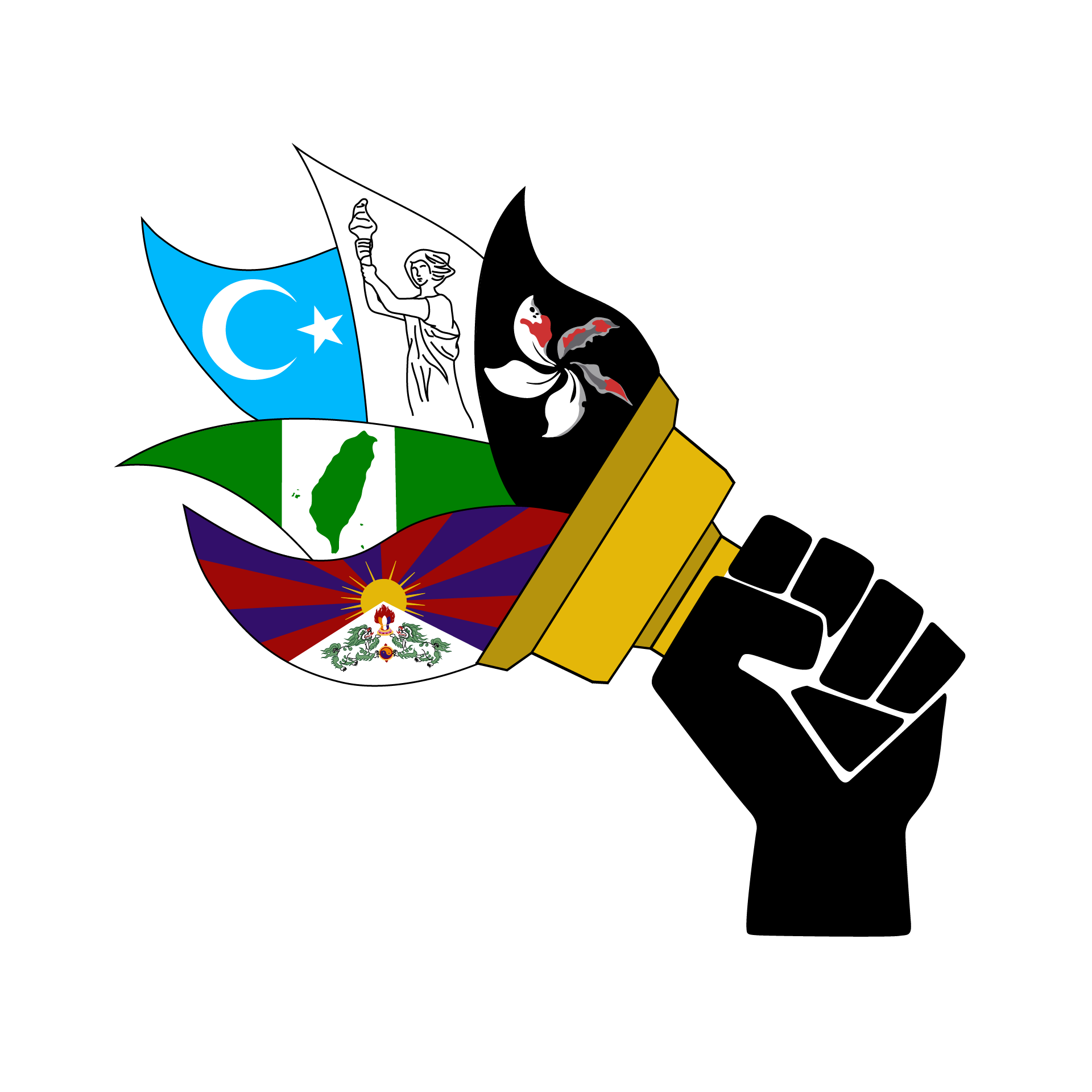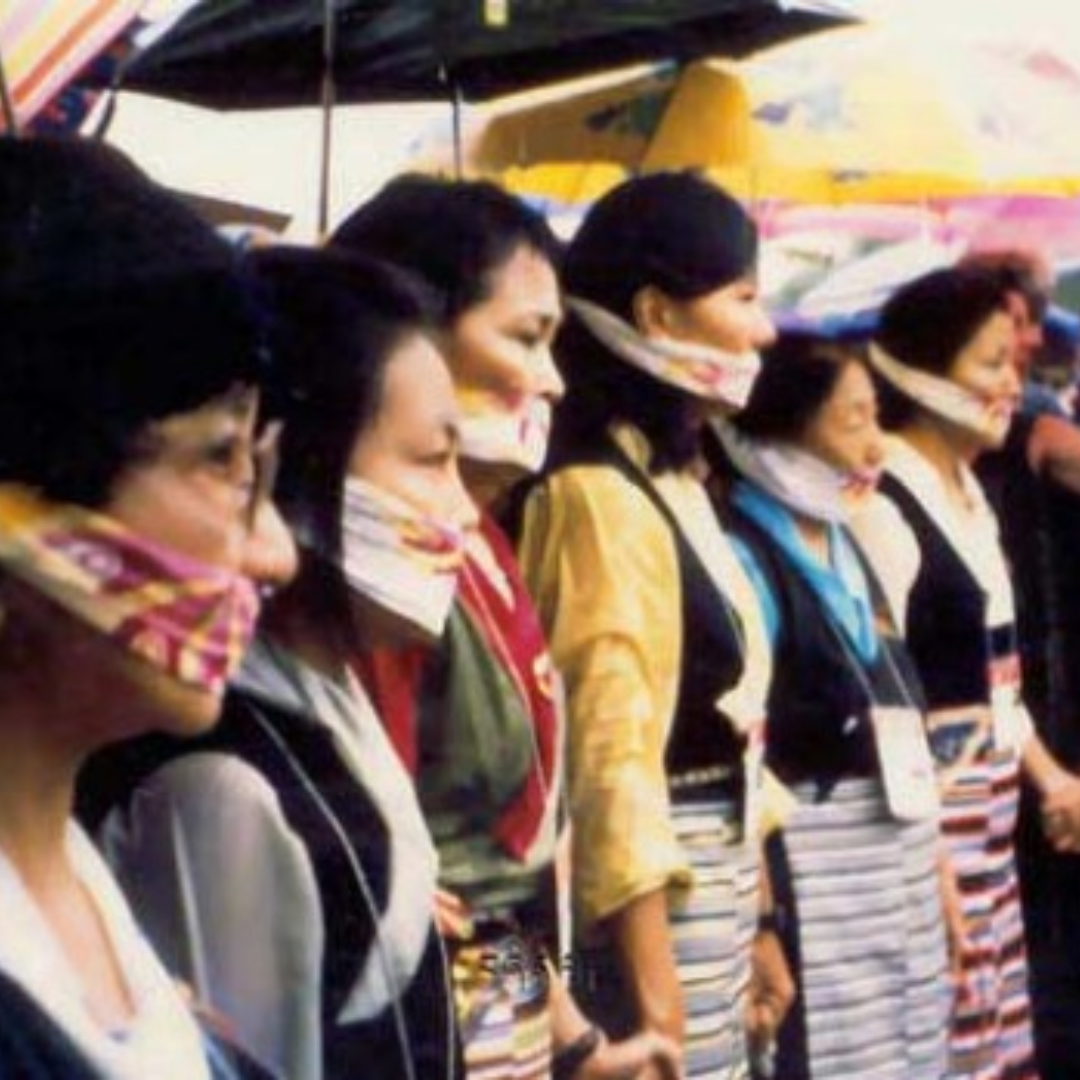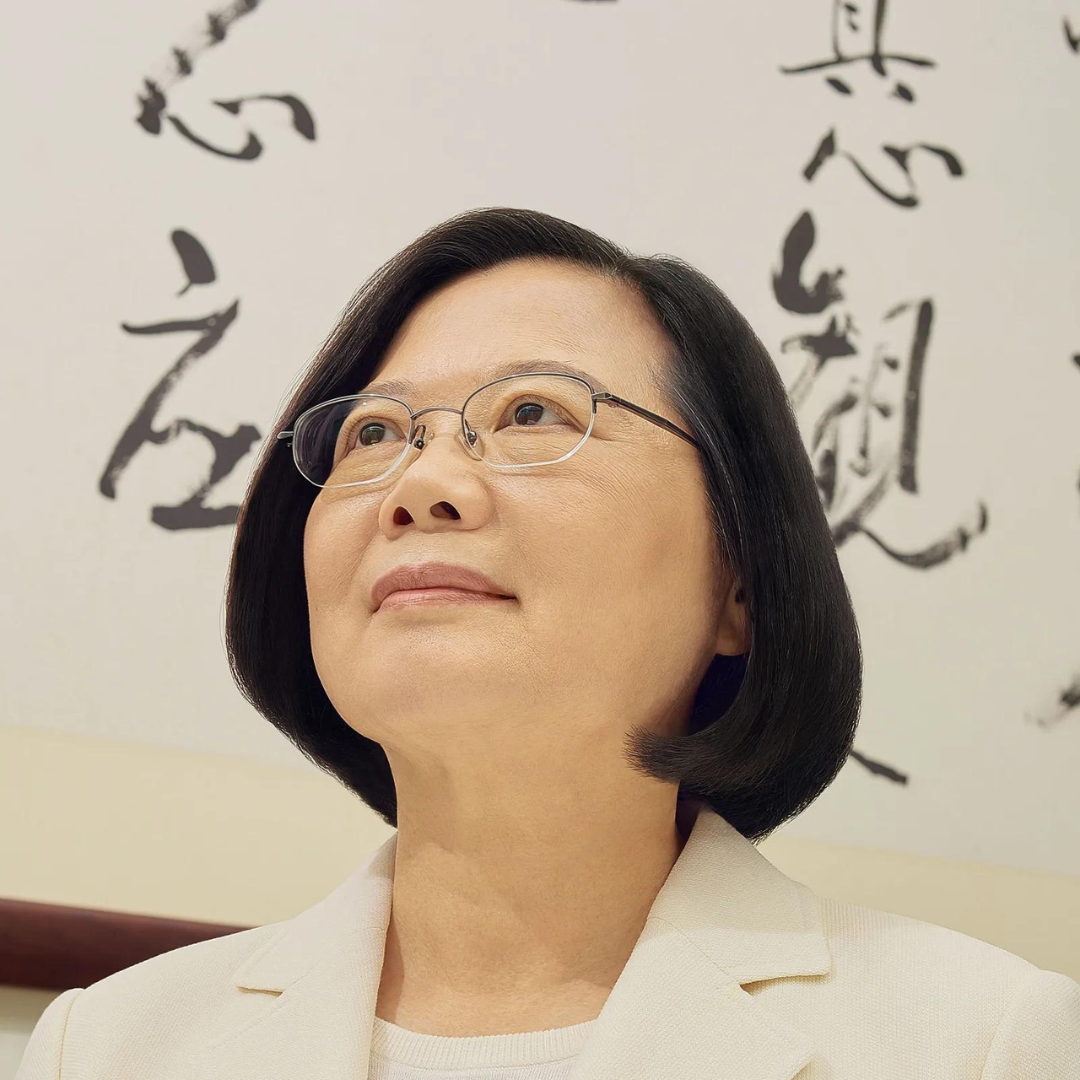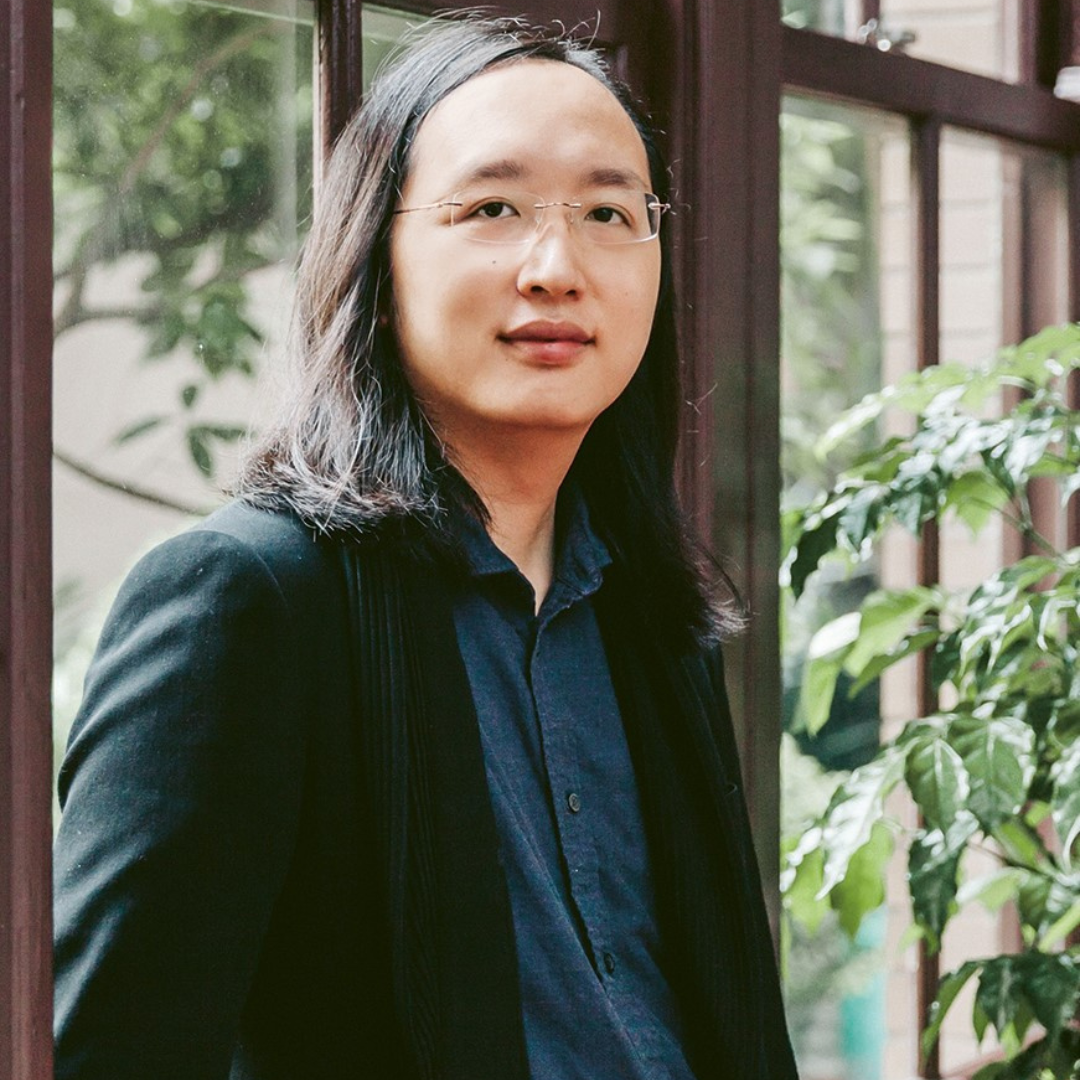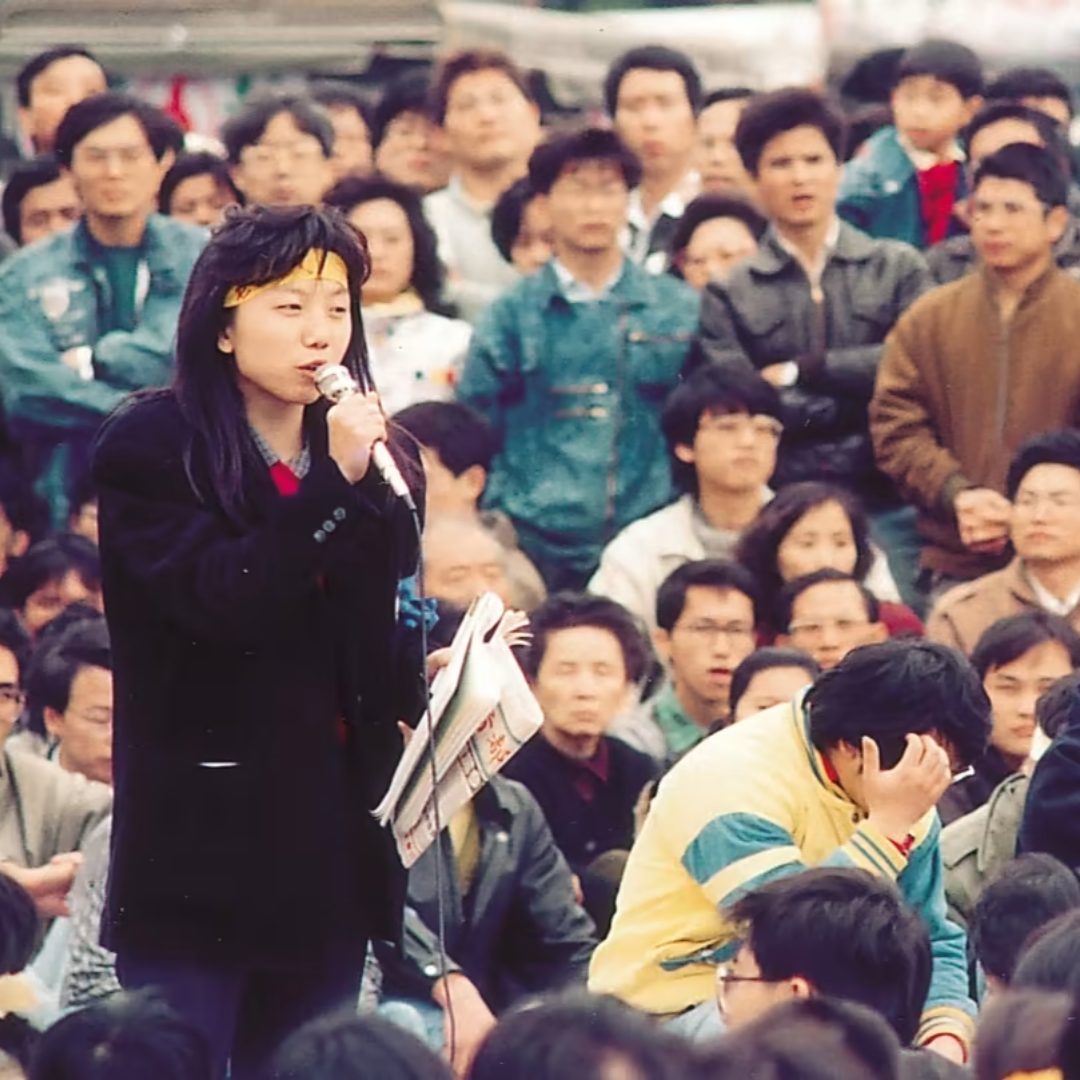PORTRAITS OF
FREEDOM
The Womxn Driving Our Freedom Movements
A Photo Exhibition at the Harvard University Cabot Library
March 25th – March 31st, 2024
While history and society often highlight prominent male figures, womxn play pivotal roles as activists, leaders, thinkers, and everyday participants. Yet, their stories frequently remain in the shadows. Portraits of Freedom: The Womxn Driving Our Freedom Movements aims to shed warranted light on stories of womxn’s dignity, humanity and resilience in times of profound difficulty and danger.
On display at the Harvard University Cabot Library from March 25-31, 2024, this photo exhibition celebrates the womxn who have played pivotal roles in the Tibetan, Uyghur, Hong Konger, Taiwanese, and Chinese freedom movements as academics, survivors, government officials, lawyers, movement leaders, and more. Our wish is that Portraits of Freedom uplifts the truth and lived experiences of these womxn in our movements and histories. A digital version of the exhibition is featured below.
WOMXN OF TIBET
Panchen Lama Demonstration
(Tibet)
After the abduction and confinement of six-year-old Gedhun Choekyi Nyima, the 11th Panchen Lama, in 1995, waves of protestors took to the streets all over the world to call for his release. Shortly after, the Chinese government appointed their own Panchen Lama by the name of Gyaltsen Norbu, whom the Tibetan people reject to this day. Presently, the whereabouts of the Panchen Lama remain unknown. Pictured here we see Tibetan women staging a sit-in protest where they call for the release of the Panchen Lama.
Tibetan Women’s Uprising
(Tibet)
On March 12, 1959, Lhasa, Tibet’s capital was filled with the sounds of feet stamping the pavement and pleas for freedom. An estimated 15,000 unarmed Tibetan women took to the streets of Lhasa to oppose the violent Chinese occupation of their country. The Chinese military responded brutally, opening fire upon the crowds. Many of the women who stood up on that epic day sacrificed their lives in pursuit of freedom. Those that escaped with their lives found themselves imprisoned and subject to inhuman torture. The surviving, exiled elders are the last generation of women left to tell the story of the Women’s Uprising, and to transmit their legacy. This event occurs 2 days after Tibetan Uprising Day, where hundreds of thousands of Tibetans protested and were brutally shot down, demonstrating the . This day marked the first active, women-led non-violent protest against the Chinese occupation and laid the foundation for peaceful resistance in Tibetan history.
UN Conference in Beijing Silent Protest
(Tibet)
As the Chinese government’s crackdown on freedom continues to worsen since its invasion of Tibet in 1959, Tibetan women face the brunt end of this violence. As a direct action, nine exiled Tibetan women stand in a circle, hand-in-hand, with their mouths covered representing the censorship and silencing from the Chinese government. A crowd of delegates to the women’s NGO Forum voiced their support on September 1, 1995 in Huairou, Beijing at this protest. These nine Tibetan women, all foreign passport holders, risking their safety held the protest to bring attention to the CCP’s oppression of their homeland Tibet.
Lhadon Tethong
(Tibet)
Lhadon Tethong is a prominent Tibetan-Canadian political activist and the face of the Tibetan Freedom Movement in exile. She first made waves in the Tibetan community at her speech in the Beastie Boys’ 1998 Tibetan Freedom Concert. After graduating from college, she worked at Students for a Free Tibet and eventually became the Executive Director. During the lead up to the 2008 Beijing Olympics, China increased militarization of Tibet to unprecedented levels spurring uprisings throughout the region. Tethong is known for work during this campaign, clandestinely entering China in 2007 and detailing the country’s preparation for the Olympics in a blog. This blog garnered the attention of security officials who arrested her. She was eventually released to her home in Canada and has since been working at Tibet Action Institute, employing digital security methods to strengthen the Tibetan independence movement. Today, she resides in Boston campaigning against China’s colonial boarding schools in Tibet. 80% of Tibetan childrens are forced to attend boarding schools that are designed to erase the Tibetan language and identity from its roots and our future, our children.
Ngawang Sangrol, the Singing Nuns in Drapchi Prison (Tibet)
As a 13-year-old, Ngawang Sangdrol became one of the youngest political prisoners in the world. She was sentenced to 3 years after protesting at the capital, calling for independence. Her 3 year sentence was quickly extended to a 23 years for repeated protests within prison despite being subject to harsh torture and brutal conditions, a testament to her fierce resolve that inspires us all today. Ngawang was part of the 14 nuns in Drapchi prison who had secretly recorded a tape that was later released to the world. Advocacy efforts in exile from Students for a Free Tibet, Amnesty International, and the US government allowed for her release and escape to exile where she lives here in Boston today.
WOMXN OF TAIWAN
Tsai Ing-wen
(Taiwan)
Tsai Ing-wen made history in 2016 by becoming Taiwan’s first female president. President Tsai has been a key figure in promoting Taiwan’s sovereignty and rallying international support for Taiwan, despite threats from China. During her tenure from 2016 to 2024, Taiwan made unprecedented progress in transitional justice, advanced the role of women in society and politics, expanded the rights of Taiwan’s LGTBQ citizens, and advocated for the expansion of the political rights of Taiwan’s youth. Steadfast in her commitment to democracy and fostering democratic unity among like-minded nations, Tsai Ing-wen has served as a protector of Taiwan’s freedom and self-determination.
Chen Chu
(Taiwan)
Chen Chu, who currently serves as the president of Taiwan’s Control Yuan and chairwoman of the National Human Rights Commission, has a long and distinguished career in politics, human rights, democracy, and government. Prior to Taiwan’s democratization, Chen once faced the threat of capital punishment for her activism and served six years in jail as one of the “Kaohsiung Eight” – a group of eight dissident leaders arrested and charged in 1979 by the KMT regime for their pro-democracy demonstrations during Taiwan’s martial law period known as the White Terror. Chen also served as the first female mayor of Kaohsiung.
Bi-khim Hsiao
(Taiwan)
The first woman to serve as Taiwan’s representative to the U.S. and Taiwan’s newest vice president-elect, Bi-Khim Hsiao has played a crucial role in strengthening diplomatic relations and advancing Taiwan’s inclusion in the international community. Known as Taiwan’s “cat warrior” countering China’s wolf warrior diplomacy, she has been a vocal advocate for Taiwan’s democracy and human rights on the global stage. Notably, Hsiao also formed a “Friends of Tibet” caucus in Taiwan’s Legislative Yuan while serving as a legislator for Hualian and is a long-time supporter of the Tibetan freedom movement.
Audrey Tang
(Taiwan)
Audrey Tang, Taiwan’s first Digital Minister, is the youngest minister without portfolio in Taiwanese history and the first transgender person to sit on the cabinet. Her entrance into politics began in the 2014 Sunflower Movement, in which she quit her job to help the protesters occupying Taiwan’s Legislative Yuan broadcast their message in protest of a black-box trade deal with China that would threaten Taiwan’s independence. Tang has spearheaded efforts to enhance digital democracy and transparency, leveraging technology to increase civic participation and government accountability. Tang’s innovative approach to governance has been instrumental in shaping Taiwan’s reputation as a global leader in digital innovation and participatory democracy.
Fan Yun
(Taiwan)
As a student in 1990, Fan Yun served as the president of the National Taiwan University student association and a Commander-in-Chief of the Wild Lily Movement, a watershed student movement that led to Taiwan’s democratization. Fan is also a prominent feminist and previously served as chairperson of the Awakening Foundation, an NGO fighting for gender equality and women’s empowerment in Taiwan.
WOMXN OF HONG KONG
#MeToo Movement
(Hong Kong)
The emergence of the #MeToo movement in Hong Kong in late 2017 marked a significant cultural shift, echoing the global phenomenon of women speaking out against sexual harassment and abuse. What began as a series of individual narratives sharing experiences of misconduct and gender-based discrimination swiftly gained momentum. However, the movement in Hong Kong took on a unique trajectory as it intersected with broader socio political currents, particularly evident during the Anti-Extradition Law protests that erupted in 2019. Women participating in the protests found themselves navigating not only the risks associated with confronting state authority but also contending with sexual harassment and assault within activist circles. Thus, the #ProtestToo campaign emerged as a response to the police and sexual violence rampant during this time.
Agnes Chow
(Hong Kong)
Agnes Chow is a prominent pro-democracy activist from Hong Kong, known for her role in various youth-led movements advocating for democratic reforms and autonomy in the region. She was a key member of the now-disbanded political organization Demosistō, which campaigned for self-determination for Hong Kong. Chow gained international attention for her fearless activism and was involved in organizing protests against the controversial extradition bill in 2019. Her advocacy for human rights and democracy has made her a symbol of the struggle for freedom in Hong Kong.
Tiffany Yuen
(Hong Kong)
Tiffany Yuen is a young pro-democracy activist and politician in Hong Kong who rose to prominence during the 2019 anti-extradition bill protests. She was a member of the pro-democracy political party Demosistō and later became a District Councillor representing the TaiKoo area. Yuen actively participated in organizing protests and advocating for democratic reforms, despite facing increasing repression from the authorities. She has been detained since February 28, 2021 as one of the Hong Kong 47, a group of 47 pro-democracy advocates charged with conspiracy to commit subversion under the Hong Kong national security law. If convicted, she could face a maximum punishment of life imprisonment. Yuen’s courage and dedication to the cause of freedom in Hong Kong have inspired many young activists.
Gwyneth Ho
(Hong Kong)
Gwyneth Ho is a journalist turned pro-democracy activist who gained prominence during the 2019 anti-extradition bill protests in Hong Kong. She was a reporter for Stand News before resigning to join the pro-democracy movement full-time. Ho has been vocal in speaking out against Beijing’s encroachment on Hong Kong’s autonomy and the erosion of civil liberties in the region. She continued to advocate for press freedom and democratic values amidst increasing censorship and crackdowns on dissent. Ho is one of the Hong Kong 47, a group of 47 pro-democracy advocates that have been detained for three years and face up to life in prison.
Carmen Lau
(Hong Kong)
Carmen Lau is a Hong Kong activist who is now living in exile in the UK. During the 2019 pro-democracy movement, she was elected as a district councilor. In 2021, however, she refused to take the patriotic oath and resigned – and later fled Hong Kong to the UK. In December 2021, along with four other Hong Kong activists, she was wanted over “blank votes incitement” during the Legislative Council elections. A warrant was issued by the court. Currently, she works as an associate of Hong Kong Democracy Council (based in Washington D.C.), focusing on international campaigning and advocacy for Hong Kong. She is also a founder of ‘Hong Kong March,’ a UK-wide cultural festival promoting Hong Kong culture. She also helps with the Hong Kong diasporic community and rebuilding Hongkongers’ civil society overseas in her personal capacity.
WOMXN OF EAST TURKESTAN
Zumretay Arkin
(East Turkistan)
Zumretay Arkin is Chair of the Women’s Committee at the World Uyghur Congress (WUC) and has worked tirelessly to support Uyghur women and refugees globally. She advocates for Uyghur rights at the United Nations, international forums, and at national parliaments around the world.
Maya Mitalipova
(East Turkistan)
Maya Mitalipova is the President of the Boston Uyghur Association and the director of the Human Stem Cell Laboratory at the Massachusetts Institute of Technology’s Whitehead Institute for Biomedical Research. She is known for her one-man protests in Harvard Square and throughout Boston and her advocacy surrounding Uyghur forced organ harvesting.
Jewher Ilham
(East Turkistan)
Jewher Ilham is the daughter of Uyghur scholar Ilham Tohti, who was detained in Beijing in 2013. As an advocate for her father, she testified before the U.S. Congressional-Executive Committee on China, wrote op-eds in the New York Times, met with a number of government officials, and received numerous awards worldwide on behalf of her father. As of today, she has published two books, worked on a full-length documentary on the plight of the Uyghurs, and is working towards her father being awarded the Nobel Peace Prize.
Rushan Abbas
(East Turkistan)
Rushan Abbas was foundational in establishing the roots of the Uyghur diaspora. Her efforts laid the groundwork for the Uyghur American Association (UAA). When Radio Free Asia launched its Uyghur service in 1998, Rushan was the first Uyghur reporter broadcasting daily in East Turkistan. She is also the founder and executive director of the nonprofit Campaign for Uyghurs. Following the detainment of her sister, Gulshan Abbas, by the Chinese government in 2018, Rushan has dedicated herself full-time to the freedom movement and Uyghur cause. In February 2022, Campaign For Uyghurs was nominated for a Nobel Peace Prize.
Uyghur Concentration Camp Survivors
(East Turkistan)
It is estimated that almost 3 million Uyghurs are in concentration camps. Due to heavy censorship and misinformation campaigns by the Chinese government, many crimes against humanity committed in the camps have gone unnoticed. In recent years, several survivors such as Mihrigul Tursun (top left), Qelbinur Sidik (top right), Tursunay Ziyawudun (bottom left), and Gulbahar Haitiwaji (bottom right) have spoken out and delivered witness testimonies at the United Nations, United States Congress, and independent tribunals where they reported of the harrowing physical and sexual violence detained Uyghur women face in the camps.
WOMXN OF CHINA
Lin Zhao
(China)
Lin Zhao was a prominent Chinese dissident who faced imprisonment and execution by the People’s Republic of China during the Cultural Revolution for her criticism of Mao Zedong’s policies. She became a symbolic figure among dissidents in Mao Zedong’s era China, as her criticism of the Communist Party regime was the most thorough among all dissidents of that time. Many Chinese dissidents from the post-Mao era believe that Lin Zhao laid the foundation for the lineage of political dissidence under the rule of the People’s Republic of China.
Wang Chaohua
(China)
Many women participated in the 1989 Tiananmen Square Protests for democratic reform in China, but Wang Chaohua was one of only two female student leaders. Her role in the pro-democracy movement landed her on the “21 Most Wanted Beijing Student Leaders list.” After spending more than six months in hiding, Wang came to the U.S. in early 1990. In the U.S., she entered academia and continued to advocate for democracy.
Kou Yanding
(China)
Kou Yanding’s story is a microcosm of the relatively active but limited civil society in China during the eras of Jiang Zemin and Hu Jintao. In the early 21st century, she founded an NGO in China, advocating for the rights of disabled individuals and promoting democratic ideals. Eventually, Kou and her NGO became targets of crackdown by the Xi Jinping regime. Her exchanges with activists from Hong Kong and Taiwan were interpreted as a political conspiracy to overthrow the Chinese government. She herself endured illegal detention and long-term surveillance. Kou Yanding’s story illustrates the decline of civil society in China under Xi Jinping’s rule and the country’s transition from a typical authoritarian society to a totalitarian regime.
Sophie Huang
(China)
Sophie Huang is a representative figure of the resilient Chinese feminist movement under Xi Jinping’s regime, despite facing repeated crackdowns. She also has deep connections with the #MeToo movement in China as the journalist who initially reported the issues. Huang was arrested and detained by the CCP regime for supporting the Hong Kong extradition bill protests, prohibited from studying abroad, and was arrested for the second time shortly after a brief release. She remains in prison to this day, facing horrific and inhumane torture.
Female and Queer Community in the A4 Revolution
(China)
In the “A4 Revolution,” a significant number of Chinese women and queer communities took to the streets, not only condemning the inhumane zero-COVID policy of the CCP regime but also directly targeting the patriarchal nature of the Chinese government. After brutally suppressing the A4 Revolution, the Xi Jinping regime began harsher retaliation and crackdowns against women and queer communities compared to other groups. In this exhibition, we feature a collective portrait to embody the decentralized spirit of this movement. Beyond the activists in the spotlight, we recognize our grassroots sisters whose names remain unknown.
